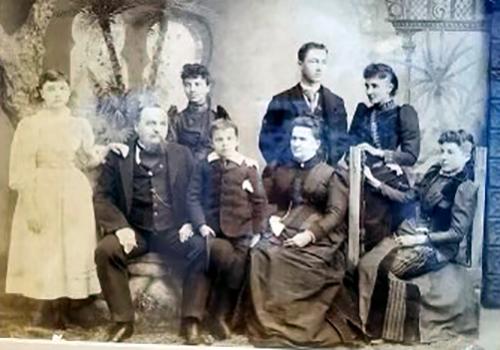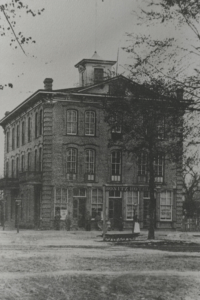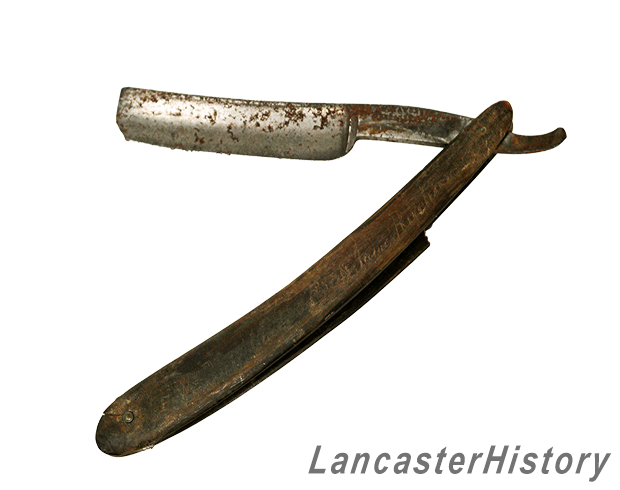A President’s Razor & The Tragedy at Lafayette Square

Article written by Patrick Clarke
Edited by Emily Miller
John Henry William Bonitz was born in Germany ca. 1840. He immigrated to the United States in 1850 and by 1856, at the age of 16, he landed a job as a messenger clerk for the Secretary of War, Mr. Jefferson Davis. William’s son, Frederich, would later write a biographical sketch of his father’s life story. William’s German heritage and skill with the language led him to be frequently consulted by Jefferson Davis’ chief clerk for foreign affairs, typically to translate correspondence with the German Embassy and Diplomatic foreign office. Again, William was only 16 at the time, so he was thrilled that his new job brought him into close contact with the most prominent men of the 19th century.
James Buchanan happened to be one of the notable men William met while in Washington, D.C. During the transition between the Pierce and Buchanan Administrations in March 1857, Buchanan requested William transfer to the White House to serve as a clerk and messenger. The 15th President was pleased to have William as a member of his new administration. On May 4, 1857, Buchanan gave William a Sheffield steel razor with a delicate bone handle as a personal gift, telling the young man that he purchased the razor while he was serving as the United States Minister to the Court of St. James in the United Kingdom. More about this razor later.
Nearly two years later, on Sunday, February 27, 1859, William witnessed a tragedy in Washington and suddenly found himself quickly packing his belongings to leave the city. Frederich Bonitz detailed his father’s recollections.
One of the most prominent politicians and Congressman of that period was Daniel Edgar Sickles, from New York, a friend of the President and for many years, a leading figure in the Democratic party. One Sunday, the 27th of February 1859, William was leaving the gate of the White House just after telling the President he was going to church, he saw General Sickles approaching Barton Key, the District Attorney, who had been accused of intimacy with Sickles wife, and as he approached to within ten feet of the two men, he saw Sickles draw his pistol and cursing Key as a betrayer of his honor deliberately shot him down, calling him a damned scoundrel who has dishonored my bed, you must die. Sickles fired and Key dodged behind a tree, crying “Don’t shoot”. Key drew an opera glass from his pocket (the one he used to observe if Mrs. Sickles was giving him the signal that the General was not at home) and threw it at Sickles; it fell harmless to the ground when Sickles shot again.
This dramatic and deadly scene was also described in numerous newspapers the next morning. The Evening Star of Washington reported:
The Tragedy Yesterday – Philip Barton Key, U. S. District Attorney, shot dead by Hon. Daniel E. Sickles, of New York. — Perhaps for the last quarter of a century no event has caused such a thrill of horror in this community as the terrible affair that transpired yesterday afternoon, resulting in the death of Philip Barton Key at the hands of Daniel E. Sickles, of New York City. (The Evening Star, Washington, D.C., Local News. Page 2, Column 1, 28 February 1859.)
Frederich continued his father’s story about witnessing the murder of Philip Barton Key.
William and several other by-standers helped carry the mortally wounded Philip Barton Key into the nearby Club House. Congressman Sickles calmly placed his gun in his coat pocket and walked away. William Bonitz ran as fast as he could back to the White House to find President Buchanan. He found Buchanan in his study preparing for church and told him about witnessing first-hand this horrific shooting. President Buchanan was stunned and almost collapsed when he heard the story. Buchanan exclaimed that he must see Congressman Sickles immediately and advised young William Bonitz that because he is a principal witness, the local authorities may detain him in jail without bond. He advised William that for his own safety he should grab some personal items and leave Washington immediately. Buchanan then gave William Bonitz a small sum of money and again urged him to leave Washington.
Having little knowledge about the laws of the United States and no reason to doubt President Buchanan’s advice, William went directly to his brother’s Washington, D.C. home.
Since the murder of Philip Barton Key took place on a Sunday, all of the banks were closed for business. William’s brother, Henry, gave him $500 and strapped it to his money belt around his waist. William then began a perilous journey through the dark in Washington, D.C., traveling through Lafayette Park. On his way to catch an excursion boat leaving for Norfolk, a robber held up William for the money Buchanan gave him but, thankfully, did not take the extra $500 from his brother. William’s final destination was Goldsboro, North Carolina where he stayed with his brother’s in-laws, Henry and Lizetta Prempert.
What were Buchanan’s motives for removing William as a principal witness to Sickles’ murder of Philip Barton Key? The historic record suggests the primary factor of political loyalty. During the Pierce Administration, Sickles served under Buchanan as a diplomatic aide during Buchanan’s three-year mission as the United States Minister to the Court of St. James in London, England. Sickles returned to New York in 1856 and won one of New York’s seats in the U.S. House of Representatives. Additionally, during the 1856 Democratic Convention at Cincinnati, Sickles played a critical support role through the powerful New York Caucus, which propelled James Buchanan into the winner’s spot for the Democratic Presidential Nomination.
Philip Barton Key and Teresa Bagioli Sickles weren’t the only two involved in an extramarital affair. Daniel Sickles had been involved in several adulterous affairs of his own. Teresa and Philip Barton Key carried on their trysts just a few blocks from the Sickles’ home, while Daniel Sickles regularly met his mistresses at hotels in Baltimore, Maryland.
With the help of U.S. Attorney General Jeremiah Black and President Buchanan, Sickles assembled a team of lawyers at no cost to the Congressman. Edwin M. Stanton served as Sickles’ primary attorney, joined by James T. Brady, one of Washington’s best criminal defense lawyers. For the first time in United States legal history, a temporary insanity plea was argued successfully in court. Stanton stated that his client (Sickles) was simply too overcome with passion to control himself. Despite Sickles’ well-known infidelity, the case quickly flipped from a murder trial to an adultery trial, publicly scorning Teresa Bagioli Sickles and making a hero out of her husband who was ultimately found not guilty of murder.

So what happened to William Bonitz when he arrived in Goldsboro, North Carolina? During his first few years in Goldsboro, between 1859 and 1862, William met Mary Emilie Stegner, a fellow German immigrant. The couple married on May 26, 1862, and remained in Goldsboro for the next 16 years. William invested his savings in 1863 to build a three-story brick hotel in Goldsboro. The newlyweds managed the Bonitz Hotel together and raised four daughters and two sons: May Emily, Florence Louise, Lisette Alice, Gerda Louise, Henry Emil, and Frederich Wilhelm Bonitz. In 1879, the hotel burned down, but William rebuilt it later that same year. By the year 1884, William and Mary, ready for retirement, handed the hotel’s business over to William’s brother Julius while they relocated further south along the ocean in Wilmington, North Carolina. Julius Bonitz exchanged the deed to the hotel for two tracts of land near Seven Springs with Dr. George L. Kirby who renamed the property “The Arlington Hotel.” On October 27, 1913, three days before his birthday, John Henry William Bonitz passed away.
Now, back to the razor! LancasterHistory is thrilled to say that William’s great, great, grandson, John Henry William Bonitz, III, donated the razor to the Wheatland Collection at LancasterHistory. The razor’s bone handle is engraved on both sides. One side says, “May 4, 1857 Washington”; the opposite, “J.H.Wm Bonitz from Presdt. James Buchanan.” William treasured this straight razor and made it part of his personal belongings. We’re grateful to welcome this historic artifact and family treasure into the collections at LancasterHistory!

